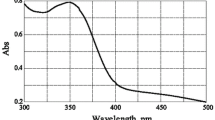Abstract
Solution equilibria of the ternary systems Ni(II)–picolinic acid (Hpic) and the amino acids aspartic acid (H2asp), glutamic acid (H2glu), cysteine (H2cys) and histidine (Hhis), where the amino acids are denoted as H i L, have been studied pH-metrically. The formation constants of the resulting mixed ligand complexes have been determined at 25 °C using a ionic strength 1.0 mol·dm−3 NaCl. In the Ni(II)–Hpic–H2asp and Ni(II)–Hpic–H2glu systems, the complexes [Ni(pic)H2L]+, Ni(pic)HL, [Ni(pic)L]− and [Ni(pic)L(OH)]2− were detected. In the Ni(II)–Hpic–H2cys system the complexes [Ni(pic)H2L]+ and [Ni(pic)L]− are present. Additionally, in the Ni(II)–Hpic–Hhis system the species [Ni(Hpic)HL]2+, Ni(pic)L and [Ni(pic)L(OH)]− were identified. The species distribution diagrams as functions of pH are briefly discussed.




Similar content being viewed by others
References
Crans, D.C., Smee, J.J., Gaidamauskas, E., Yang, L.: The chemistry and biochemistry of vanadium and the biological activities exerted by vanadium compounds. Chem. Rev. 104, 849–902 (2004)
Lubes, V.: Vanadium(III) complexes with picolinic acid and dipicolinic acid in aqueous solution. J. Solution Chem. 34, 899–915 (2005)
Yasumatsu, N., Yoshikawa, Y., Adachi, Y., Sakurai, H.: Antidiabetic copper(II) –picolinate: impact of the first transition metal in the metallopicolinate complexes. Bioorg. Med. Chem. 15, 4917–4922 (2007)
Fukui, K., Fujisawa, Y., Ohya-Nishiguchi, H., Kamada, H., Sakurai, H.: In vivo coordination structural changes of a potent insulin-mimetic agent, bis(picolinato)oxovanadium(IV), studied by electron spin-echo envelope modulation spectroscopy. J. Inorg. Biochem. 77, 215–224 (1999)
Martell, A.E., Smith, M., Motekaitis, R.J.: NIST Critical Stability Constants of Metal Complexes Database. US Department of Commerce, Gaithersburg (1993)
Powell, K.J., Pettit, L.D.: IUPAC Stability Constants Database. Academic Software, Otley (1997)
Kolthoff, I.M., Stenger, V.A.: Volumetric Analysis, vol. II, p. 94. Interscience Publishers, New York (1947)
Jeffery, G.H., Bassett, J., Mendham, J., Denney, R.C.: Vogel’s Textbook of Quantitative Chemical Analysis, 5th edn, p. 327. Longman Scientific and Technical, New York (1989)
Gran, G.: Determination of the equivalence point in potentiometric titrations. Part II. Analyst 77, 661–671 (1952)
Biedermann, G., Sillén, L.G.: The hydrolysis of metal ions. IV. Liquid-junction potentials and constancy of activity factors in NaClO4–HClO4 ionic medium. Ark. Kemi 5, 425–540 (1953)
Brito, F., Araujo, M.L., Lubes, V., D’Ascoli, A., Mederos, A., Gili, P., Domínguez, S., Chinea, E., Hernández-Molina, R., Armas, M.T., Baran, E.J.: Emf(H) data analysis of weak metallic complexes using reduced formation functions. J. Coord. Chem. 58, 501–512 (2005)
Sillén, L.G., Warnqvist, B.: High-speed computers as a supplement to graphical methods. VI. A strategy for two-level Letagrop adjustment of common and “group” parameters. Features that avoid divergence. Ark. Kemi 31, 315–339 (1969)
Veliz, L., Martínez, J.D., Araujo, M.L., Brito, F., Lubes, G., Rodríguez, M., Lubes, V.: Estudio de la hidrólisis del ion Niquel(II) y de la formación de los complejos de Niquel(II) con los ácidos Picolínico y Dipicolínico en NaCl 1,0 mol.dm −3 a 25 °C. Avances en Quím. 6, 3–11 (2011)
Lema, J.: Estudio de formación de los complejos de níquel(II) con lo aminoácidos: ácido aspártico, ácido glutámico, histidina y cisteína mediante medidas de emf(H) en NaCl 1,0 M a 25 °C. Undergraduate Thesis, Escuela de Química, Facultad de Ciencias, Universidad Central de Venezuela, Caracas (2010)
Alderighi, L., Gans, P., Ienco, A., Peters, D., Sabatini, A., Vacca, A.: Hyperquad simulation and speciation (HySS): a utility program for the investigation of equilibria involving soluble and partially soluble species. Coord. Chem. Rev. 184, 311–318 (1999)
Acknowledgments
The authors are grateful for financing provided by the Decanato de Investigación y Desarrollo, from the Simon Bolivar University. Lino Hernández and Edgar Del Carpio thank Simon Bolivar University for scholarships.
Author information
Authors and Affiliations
Corresponding author
Rights and permissions
About this article
Cite this article
Centeno, M.M., Martínez, J.D., Araujo, M.L. et al. Solution Equilibria of Ternary Systems Involving Nickel(II) Ion, Picolinic Acid, and the Amino Acids Histidine, Cysteine, Aspartic and Glutamic Acids. J Solution Chem 43, 1011–1018 (2014). https://doi.org/10.1007/s10953-014-0185-0
Received:
Accepted:
Published:
Issue Date:
DOI: https://doi.org/10.1007/s10953-014-0185-0




